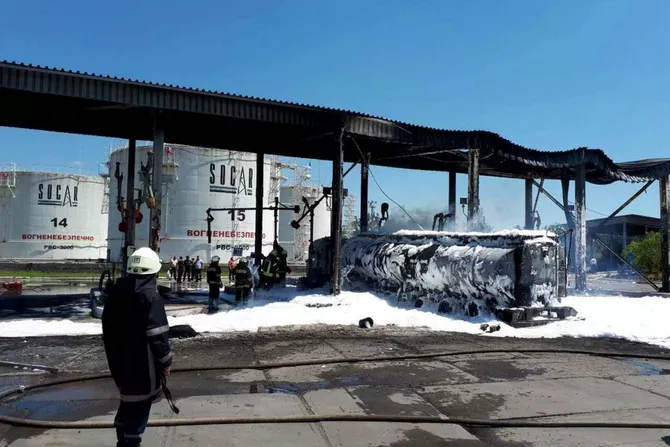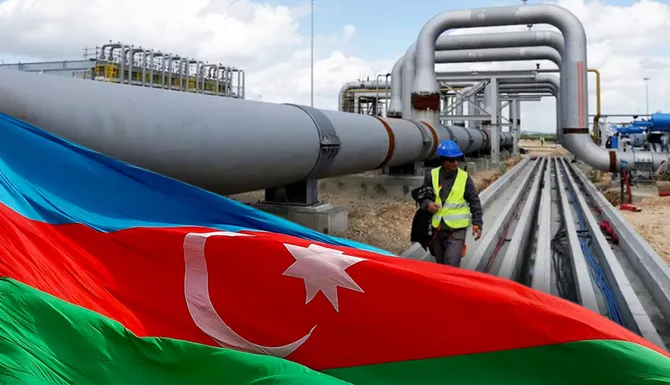
Russia’s renewed attacks on Azerbaijani energy assets in Ukraine have revealed not only the scale of Moscow’s military recklessness but also the resilience of an emerging strategic partnership between Baku and Kyiv.
In the early hours of Monday, August 18, Russian drones struck once again at a SOCAR oil depot in Ukraine’s Odesa region. This was the second attack on Azerbaijani-owned energy facilities in just ten days, the first having occurred on August 8. The strike destroyed 17 fuel storage tanks, a pumping station, and the operator and technical facilities of the depot. Ukrainian emergency services reported a massive fire, which required the efforts of more than a hundred rescuers, volunteers, National Guard troops, local firefighting units, as well as the deployment of a firefighting robot and train.

Ukraine’s Energy Minister Svitlana Hrynchuk and President Volodymyr Zelensky confirmed the attack, calling it yet another blow to the country’s critical infrastructure. SOCAR, Azerbaijan’s state oil company, has around 60 gas stations across Ukraine, including in Kyiv, Kharkiv, Odesa, and Lviv, along with several oil depots. Azerbaijani President Ilham Aliyev has already described Russia’s strikes as deliberate acts.
Moscow, however, has tried to downplay its motives. Russian experts quoted in domestic media claim that the Odesa oil depot had not been operational in recent years, alleging that the site could have been used by Ukraine to store refined fuels, military equipment, or even naval drones. Yet such explanations appear more like retroactive justifications than credible assessments.
In Baku, analysts see the situation very differently. Elhan Shahinoglu, head of the Atlas Research Center, told JAMnews that Russia is deliberately targeting SOCAR’s assets in Ukraine as a way to undermine growing energy ties between Baku and Kyiv. “The Kremlin is concerned about Azerbaijani-Ukrainian cooperation and is trying to block it. But by targeting SOCAR’s facilities, Moscow will only achieve the opposite. Azerbaijan will respond by deepening its partnership with Ukraine across all sectors,” Shahinoglu explained.
Indeed, the timing of the attacks seems to have backfired. Just days after the first Russian strike on SOCAR’s Odesa depot, President Aliyev informed Zelensky that Azerbaijan would provide an additional $2 million in assistance to Ukraine. Moreover, energy cooperation between the two countries is accelerating, not stalling.
According to Interfax-Ukraine, Minister Hrynchuk has confirmed that Kyiv is negotiating new natural gas deliveries from Azerbaijan. Discussions also include allowing foreign companies to store gas in Ukraine’s underground facilities and broader cooperation under the U.S.-Ukrainian Recovery Fund. New supplies could even arrive before the winter heating season if the parties finalize an agreement in time.

Photo: Caspian Barrel
The trial stage of Azerbaijani gas deliveries through the Trans-Balkan Corridor has already been completed, and both sides are now preparing a long-term bilateral contract. While Ukrainian officials acknowledge the risks of further Russian strikes on energy infrastructure, they also emphasize the importance of diversifying supply and strengthening partnerships with trusted allies.
The sense of urgency is underscored by a landmark agreement signed in late July between Naftogaz, Ukraine’s state oil and gas company, and SOCAR Energy Ukraine, a subsidiary of SOCAR. The deal, which caused a stir in energy markets, provided for the pilot import of Azerbaijani natural gas via the Trans-Balkan route through Bulgaria and Romania. This was not, however, the first attempt at energy cooperation between the two states. As far back as 2011, Naftogaz had negotiated with SOCAR for the annual supply of 2 million tons of crude oil. More recently, in 2021, the two sides signed a memorandum of understanding on the joint development of onshore and offshore technologies, with SOCAR’s extensive expertise in Black Sea drilling seen as a major asset.
Although Russia’s war has complicated the development of Azerbaijani-Ukrainian energy ties, it has not stopped them. On the contrary, Moscow’s destructive tactics have reinforced the determination of both Baku and Kyiv to press ahead. Azerbaijan brings to the table technological know-how and a reliable supply of resources, while Ukraine provides access to storage and a critical market eager for diversification.
The Kremlin may have hoped that targeting Azerbaijani infrastructure would intimidate Baku and slow down cooperation with Kyiv. Instead, the result has been the opposite: accelerated negotiations, renewed investment in shared projects, and closer political ties.
Baku and Kyiv are sending a clear signal to Moscow-they will not play by its rules. Rather than deterring energy cooperation, Russia’s aggression is pushing Azerbaijan and Ukraine into even deeper alignment, reshaping the geopolitical map of the region in ways the Kremlin did not anticipate.
By Tural Heybatov
Share on social media